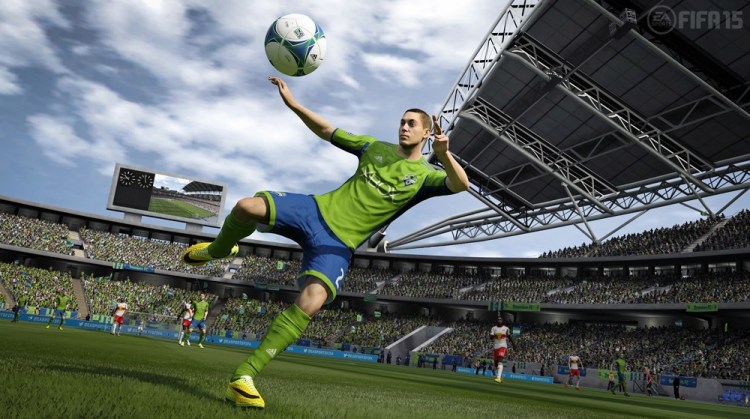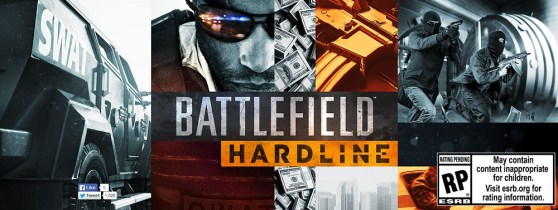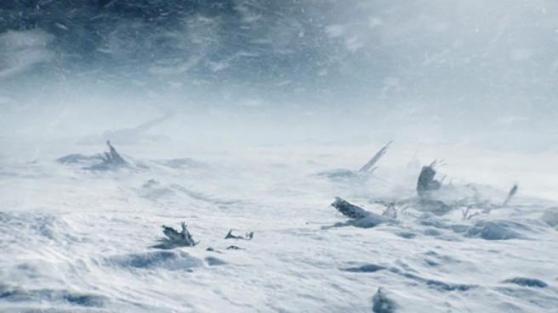Moore: We take great pride in—we were working on next-gen a couple of years out. We made sure we got our dev kits. Sony and Microsoft in particular were great at getting our core teams what they needed, and then we had a very strong focus for being ready around launch. Hardware-led software is not a good combination.
But at the same time, some franchises needed a bit more room, Need for Speed being one. While we got a very good Need for Speed out around launch, we decided to push back and not have one in FY2015. Probably you’ll see it again in FY2016. Just giving that team, Ghost Studios in Sweden, more breathing room to put some extra polish on the game. They have great ideas for breathing some fresh life into the game in some innovative ways. It wasn’t going to happen in 12 months.
Contrary to popular belief, we don’t push out games that aren’t ready. That might be the subject of laughter, but we don’t. We’re constantly looking at games and trying to figure out—The team will tell us when we think they’re ready. We try to factor a ship date. My team’s job is to build demand generation. As the guy responsible for all sales and marketing here, I’m figuring out when the right time is. But we absolutely do not force march a development to hit a ship date.
There have been numerous occasions, which you will never know of, where games have been scheduled to ship one day and then have been pushed out. Because we never announce the original date, you never know they’ve slipped. But a number of games, some of which are due in the next year or so, that were schedule originally to be earlier. We looked at them and said that they need more time.
GamesBeat: Battlefield: Hardline — is that for this year?
Moore: Oct. 21.
GamesBeat: That seems to be a challenge, trying to push that out, but you also had a Battlefield release last year.
Moore: Different studio. Hardline is built right there, literally 100 feet away, and they’ve been working on it for a number of years. Once the Frostbite engine was at a point where DICE felt good about giving it to another studio, that was given immediately to Visceral. It was in development even parallel to the time that they were doing Dead Space here. And then as that team rolled off, they rolled full-time onto Battlefield Hardline.
It’s not like we flipped from when Battlefield 4 was finished and then started Hardline. When you see the game, you’ll understand. It’s a very deep game, and it’s been a number of years in development.
GamesBeat: It seems like some of these things are very important, to keep getting them out in front of the players on an annual basis.
Moore: Yes and no. Sports, definitely. Tonight we’ll announce the Madden cover athlete. That’s always a big deal. I just found out who it is, and I have to call John Madden. I make my annual call to John. He likes to know in advance, over in Pleasanton [Calif.]. He doesn’t like to hear about it on television. He wants to hear it himself.
But yeah, FIFA and Madden in particular, NHL looks spectacular, and the UFC is exciting for us. That title has a lot of momentum. It looks gorgeous. I was just reading the Digital Foundry analysis on Eurogamer this morning. The game looks great. It’s reminiscent of when we used to do Fight Night, when you have just two characters on the screen. With the flesh tones and the lighting you can do, it’s a gorgeous game. I’m looking forward to that one.
The sports titles are different, yes. Those are seasonal, with the exception probably of UFC. Gamers want their new game when the season starts. That’s what we’ve always delivered.
GamesBeat: The measure of how hard next-gen is, to me, seems to be that everyone has moved to fewer titles already.
Moore: We did that a number of years ago. I can’t speak for other developers and publishers. I’m in awe of what our teams did. We had five games ready to go. I don’t think any publisher, even the first parties, had five. That’s important.
Our job, which we committed to both Sony and Microsoft, is to be there at launch with big brands and big franchises. I would say that our development teams can pat themselves on the back. It’s been a strong start to this console cycle. I think EA dev teams have been part and parcel of that success for Sony and Microsoft. Without EA games like FIFA and Madden and Battlefield and Need for Speed, I don’t think this hardware cycle would have got off with as strong a start as it did. There would clearly have been a lot less games. Having those big brand games ready to go that are familiar, both to the gamer and to parents who are looking to buy the games — a lot of these consoles are gifts first time out, particularly in the holiday period — our dev teams did a tremendous job. As evidence for your point, other dev teams are still trying to figure out how to ship their first title on next-gen.
GamesBeat: From this point on, does anything affect the slate or the schedule more? You’re past launch now.
Moore: You’ve always had a three-year plan. Teams are working on titles right now — Star Wars is probably the best example. How do you build your release schedule? Teams will tell you they feel they’re ready for Q3 FY2017 or whatever. My job is to manage the release from a retail and digital perspective. How do we make sure everything isn’t on top of each other? If we can allow a team more time –“Why not take another 90 days, because we have this ready here?” — a lot of teams generally say, “Yes, please.” We allow them to do that.
In the old days you called it merchandising. Retailers don’t want a lot of titles all in one month. We also need to make sure we launch them properly. That requires room, typically at retail. It’s going to be a busy fall for us. You’re going to see some ship dates. Hardline is coming. FIFA is coming. Madden is coming. UFC will be out. Dragon Age is coming somewhere. Sims 4 is coming somewhere. You’ll know more on Monday. That’s busy. We just have to figure out how we stagger these releases.
GamesBeat: How about new IP? Star Wars, I don’t know if that counts as that for you guys.
Moore: We ask ourselves that question all the time. It is for us, because other than The Old Republic, we’ve never done big triple-A games. You’re going to see a kickoff video on Monday that will give you an insight into how seriously and how reverentially we’re taking the stewardship of this intellectual property and bringing it to life. Particularly now that Lucas is part of Disney and JJ Abrams is working on the movie, all of a sudden it feels like this is renaissance that the IP needed.
These won’t be movie games. They will be tied in to what I think will be renewed discovery, from a generation that actually doesn’t remember Millennium Falcons and X-wings and TIE fighters. You say C-3PO or R2-D2 and they say, “What?” The average kid has no idea. The average 20 year old wasn’t close to being born when Star Wars came on. The subsequent releases have come, but that core remembrance of 1976, sitting in a movie theater and watching Death Stars and everything—tou look at it now and it’s pretty cheesy. But it was awesome, as you probably remember.
So we see that as new IP. You’re going to see bits and bobs of new intellectual property on Monday and throughout the show. Little teases and what have you.
GamesBeat: It seems like it’s a large hurdle for a new IP to get over these days, after you take care of all those things you already mentioned.




